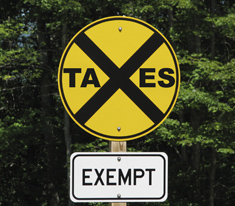February 11, 2014
Many nonprofits would like to create or expand revenue-producing activities in addition to their existing sources of primary financial support.

- Membership dues
- Fundraising events
- Government, foundation or corporate grants
- Program service revenue
- Investment income
- Rental income
- Gains from sale of assets or merchandise
- Tax-exempt revenue
Depending on the type of nonprofit organization and the source of the revenue, there may be tax implications both to the nonprofit and to its members, benefactors or customers.
In most cases, revenue is substantially related to an organization’s exempt purposes and therefore is tax-exempt. This would generally include membership dues, fundraising events, and government, foundation or corporate grants.
Membership dues are tax-exempt to the organization and generally are deductible as charitable contributions or business expenses by the members. Tickets to fundraising events generally are deductible as charitable contributions or business expenses, but only to the extent that the cost exceeds the fair market value of goods or services received, such as a dinner served at the event.
Revenue that is not tax-exempt
Not all revenue is tax-exempt. Program service revenue is divided into two categories: exempt function income and unrelated business income, which gives rise to an unrelated business income tax obligation.
Exempt function income is derived from the organization’s exempt purposes. Examples include ticket sales income received for admission to an exhibit presented by a tax-exempt arts organization and tuition received by a tax-exempt school.
Unrelated business income is generated by activities that are not related to the organization’s exempt purpose but rather are conducted primarily for the purpose of raising funds for the organization. An example would be a tax-exempt organization that publishes a journal and sells advertising to outside businesses.
For an example of both exempt function income and unrelated business income, assume that a membership organization was formed to foster cultural unity and to educate its members about China. It is exempt from federal income tax as an educational and cultural organization. Membership is open to anyone interested in the Chinese heritage.
As part of its activities, the organization sponsors a series of travel tours to China. The tours are divided into two categories. The first set of tours consists of trips to China that are designed to immerse participants in Chinese history, culture and language. Substantially all of the daily itinerary includes scheduled history and cultural heritage, as well as visits to destinations selected because of their historical or cultural significance or because of instructional resources they offer.
The second set of tours also offers trips to China, but rather than including scheduled instruction, participants are given the option of taking guided recreational and shopping tours of various Chinese locations.
Based on the facts and circumstances, sponsoring the first set of tours is an activity substantially related to the organization’s exempt purposes and does not constitute an unrelated trade or business.
However, sponsoring the second set of tours does not contribute substantially to the accomplishment of the organization’s exempt purposes and, therefore, constitutes an unrelated trade or business.
There is nothing wrong with sponsoring a taxable activity. The primary objective of the unrelated business income tax is to eliminate a source of unfair competition by placing the unrelated business activities of exempt organizations on the same tax basis as the nonexempt business enterprises with which they compete. However, the organization should consider the tax as a cost of providing the activity, and set the price accordingly.
Revenue of an exempt organization is includible in the computation of unrelated business taxable income if it is income from trade or business, the trade or business is regularly carried on by the organization, and the conduct of the trade or business is not substantially related to the organization’s performance of its exempt functions.
So, the operation of a sandwich stand by a hospital auxiliary for only two weeks at a state fair would not be the regular conduct of trade or business, so would not be taxable. Also, income derived from conducting an annual dance or similar fundraising event for charity would not be income from trade or business regularly carried on.
Other sources of exempt function revenue might include sponsoring conventions and trade shows, and soliciting sponsorship payments that include acknowledgment of the sponsor’s name or logo at a meeting, but not outright advertising of the sponsor’s products or services.
Whether exempt function revenue or unrelated business income, nonprofits have the opportunity to create or expand revenue-producing activities without forfeiting their overall tax-exempt status.
This article was originally posted on February 11, 2014 and the information may no longer be current. For questions, please contact GRF CPAs & Advisors at marketing@grfcpa.com.